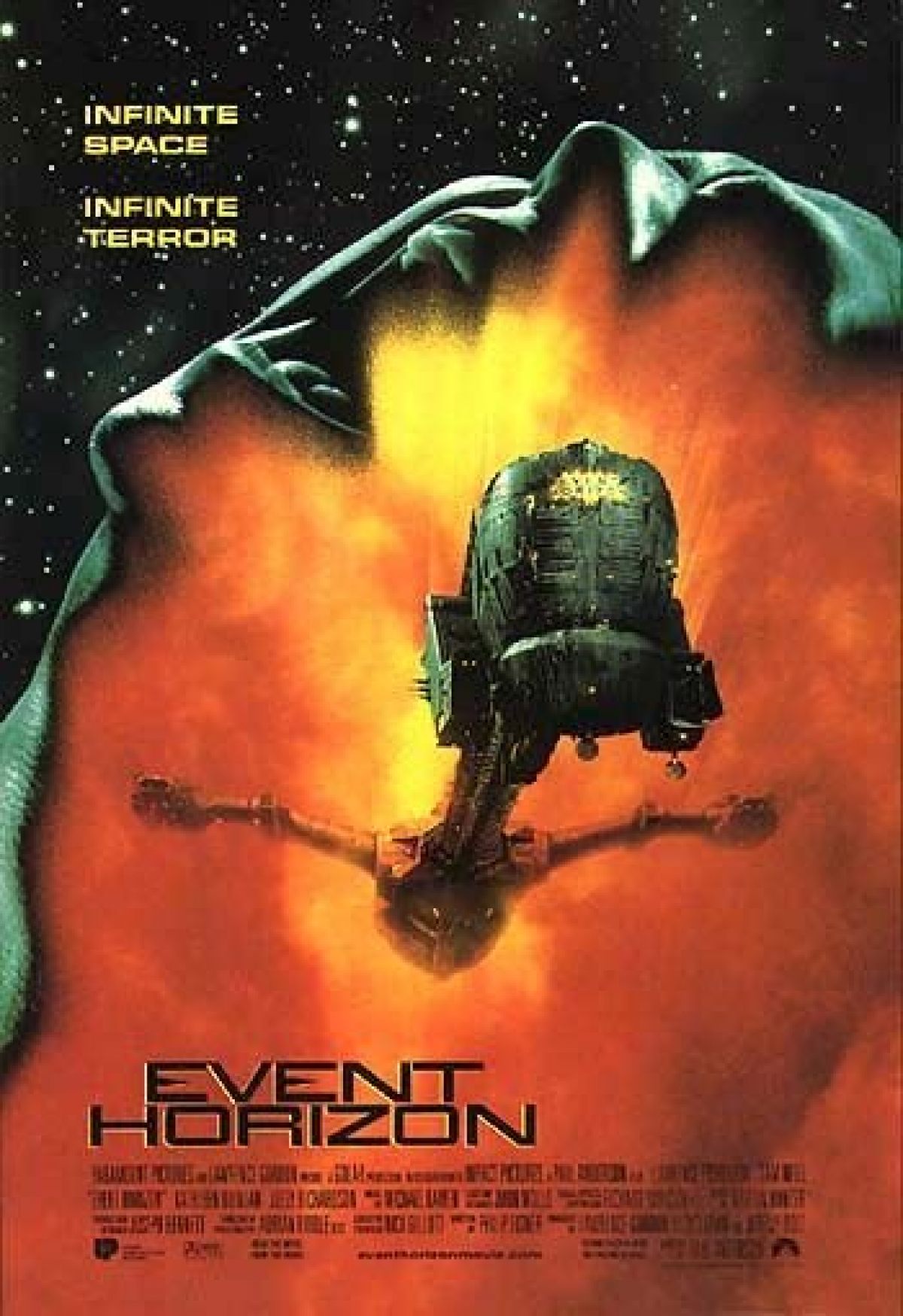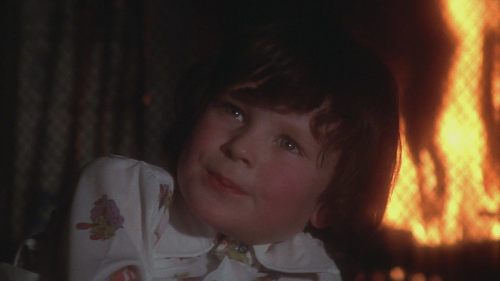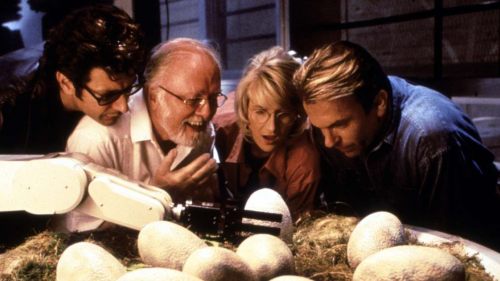The Savage Stack - EVENT HORIZON (1997)
There’s always going to be – for lack of a better term – a stack of films we’ve been meaning to get to. Whether it’s a pile of DVDs and Blu-rays haphazardly amassed atop our television stands, or a seemingly endless digital queue on our respective streaming accounts, there’s simply more movies than time to watch them. This column is here to make that problem worse. Ostensibly an extension of Everybody’s Into Weirdness (may that series rest in peace), The Savage Stack is a compilation of the odd and magnificent motion pictures you probably should be watching instead of popping in The Avengers for the 2,000th time. Not that there’s anything wrong with filmic “comfort food” (God knows we all have titles we frequently return to when we crave that warm and fuzzy feeling), but if you love movies, you should never stop searching for the next title that’s going to make your “To Watch” list that much more insurmountable. Some will be favorites, others oddities, with esoteric eccentricities thrown in for good measure. All in all, a mountain of movies to conquer.
The seventy-seventh entry into this unbroken backlog is Paul W.S. Anderson's utterly insane outer space rip-off cinema hybrid, Event Horizon...

When analyzing the greatest entries into the rip-off cinema canon, the most tantalizing pieces of schlock were often the ones that didn't just stick to pulling material from one previous success. In this arena, single sourcing is a somewhat slothful approach on the filmmaker's part, and usually results in nothing more than peculiar curiosities, often distinguished by cultural idiosyncrasies (see: the trash cinema products of Turkey). The Italians were often the best at this form of drunken filmic parroting, tossing multiple influences into a blender, and subsequently churning out lurid treats such Lucio Fulci's batshit fantasy opus Conquest ('83), or Bruno Mattei's Terminator ('84) / Aliens ('86) combo, Shocking Dark ('89). Essentially, when more ingredients were tossed into this dumpster stew it frequently lead to a more satisfyingly tasty result, as the viewer is often attempting to figure out how they crammed all these disparate basics into one sub-90 minute motion picture.
Paul W.S. Anderson's Event Horizon ('97) feels like the '90s studio counterpart to those classic cash-in riffs, as the Mortal Kombat ('95) trash cinema madman (and poster child for vulgar auteurists everywhere) tries his hand at a "Hellraiser in space" movie, indisputably besting the actual "Hellraiser in space" sequel that was released just a year before by Dimension. On top of the blatant Clive Barker cosplaying – whose Industrial Goth trappings Anderson brings to life with the full force of a Paramount budget – the filmmaker tosses in a solid heap of The Haunting ('63), Solaris ('72), Alien ('79), The Shining ('80), H.P. Lovecraft, and a primo Hammer-ready villainous freak out from the one and only Sam Neill. It all strangely amalgamates into a screeching, diverting slice of mainstream horror that's almost completely fueled by pure spectacle.
The year is 2047, and we're hovering around Neptune’s orbit aboard the intergalactic rescue vessel, Lewis & Clark. Its crew is an international blue collar collection that would make Dan O'Bannon and Ron Shusett smile – Captain Miller (Laurence Fishburne), Lt. Starck (Joley Richardson), the handy, wise-cracking Cooper (Richard T. Jones), tech man Smith (Sean Pertwee), and medical officers Peterson (Kathleen Quinlan) and DJ (Jason Isaacs). Accompanying the L & C grunts is Dr. William Weir (Neill), who designed their mission's central objective: the Event Horizon. Years ago, the Event Horizon vanished into the ether of space, until it recently reappeared on its manufacturers’ radar. Now, these laboring space cadets are tasked with finding if any of that ghost ship's crew are still alive, as the technology Weir pioneered seemed to do its job too well.
You see, the Event Horizon doesn't just travel like any normal spacecraft. Through a rotating, iron encrusted core – that sort of looks like a pendant your metal-obsessed cousin would've bought at Hot Topic and worn around their neck at early Korn shows – the vessel is able to fold the cosmos onto itself, jumping from one point in the galaxy to the next in a fraction of the time as a normal rocket ship. Yet as soon as Miller & Co. step aboard the massive "tomb" (as the Captain refers to it), it becomes clear this vessel has been beyond the reaches of human imagination. Following an accident docking the Lewis & Clark, the crew find themselves stuck aboard the Event Horizon, each experiencing intensely personal disturbances that shake them to their core. Meanwhile, Weir endures visions of his dead wife, who beckons for him to join her in whatever pit she ended up in after taking her own life.
It's during these haunting sequences that Anderson – with the help of actual Aliens ('86) cinematographer Adrian Biddle and production designer Joseph Bennett (Event Horizon's true MVP) – really brings this celestial spook show to life. For years, critics have hailed Ridley Scott's initial sci-fi masterpiece as being an "outer space haunted house movie", but Anderson literalizes that concept, once we realize that the Event Horizon may have actually visited Hell when opening its time-hopping gateway and brought back a suitably demonic presence with it. Transmissions of her previous crew clawing their eyes out in an orgiastic fit of violence are stomach-turning, while Peters chases a maimed, spectral iteration of her (possibly dead) son around the ship's glowing computer shafts. By the time the shit hits the fan in the final reel, Anderson is unleashing a waterfall of blood that would make the Overlook Hotel jealous, pulling out all the stops while Michael Kamen and Orbital's electro-classical hybrid score achieves deafening levels of bombast.
While many (rightfully) identify with Sam Neill as Dr. Grant from Steven Spielberg's seminal dinosaur blockbuster Jurassic Park ('93), in Event Horizon the Irish-Kiwi thesp is pulling from his pure genre days, back when he was hitting histrionic highs with Andrzej Zulawski (whose Possession ['81] still contains Neill's maddest work) and John Carpenter (whose In the Mouth of Madness (’95) he'd cackled through two years prior). As Dr. Weir, Neill is relishing his descent into disfiguring nuttiness, going from paranoid, wide-eyed skeptic to full blown Mephistopheles, rising out of vats of burning oil. It's a horror villain performance for the ages, with Neill delivering juicy hambone dialogue like "where we're going, we won't need eyes to see." One imagines Neill took a single read of Philip Eisner's script before signing up, as he strikes the perfect tone, owning an air of sinister class that really elevates the movie's whole.
Though the glimpses of Hell we finally do see during the movie's climax – as Miller rushes to try and detonate the bridge connecting the ship's core from the rest of its body – are suitably gnarly (involving torture, spiked heads, and much torn, naked flesh), the original cut of Event Horizon reportedly ran over two hours (roughly 130 minutes). In it, the violence reached near NC-17 levels of unpleasant mayhem, and test audiences apparently hated it. Paramount forced Anderson to shorten the movie by 30 minutes and tone down the content, resulting in the theatrical cut that debuted in theaters (with no help from a rather ghoulishly half-assed marketing campaign). Event Horizon flopped – earning just over $26 million domestic on a budget of $60 mil – but gained a cult audience on VHS. Unfortunately, despite a "Director's Cut" Blu, it turned out that the nastier footage was lost due to poor archiving, so all that remains is what ran through projectors during the picture’s first run.
Still, for a movie this heavily compromised, Event Horizon remains the very best entry on Anderson's otherwise questionable filmography (though his Resident Evil series ['02 - '16] will always have its bizarre defenders). It's a movie that shamelessly wears its influences on its sleeve, borrowing and flat out stealing moments from better motion pictures and somehow still making them work within the context of its rather garish pulp sci-fi/horror construct. There's no real deeper subtext to the film; or grandiose designs on being anything beyond a spook-a-blast nightmare for '90s kids looking to have some fun with a (probably) nerdy date. It's a shame we've never seen Anderson rise to this level of huckster entertainer again during his career, as for a brief moment in (folded) time, he was one hell of a modern answer to the shameless Italoschlock kings of old.
Event Horizon is available now on Blu-ray from Paramount.



